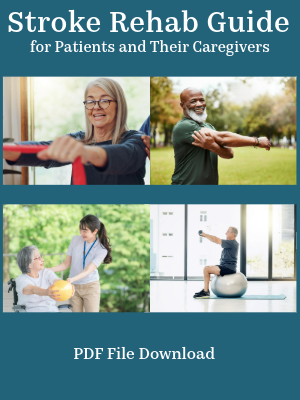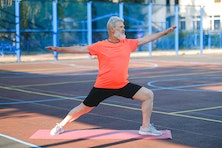Submissions from Readers
Mild Stroke
by Kathy
(Surrey)
Question:My mum has had a mild stroke. She is just forgetting things like what comes after Monday, times of the day, etc. We are trying to help her relearn, however, is there a recommended formula, and can we get some books to help? She said today that she is getting on her own bloody nerves and we are laughing a lot, however, she has lost a lot of confidence and is feeling frustrated. I look forward to hearing from you.
Answer: Kathy, there are many online speech therapy resources, and there are other sites as well with brain games. Even educational sites for children would be helpful as they have games for memory, math, etc. for free. Theadultspeechtherapyworkbook.com has many free ideas in their blog. Other ideas include playing board games, puzzle or brain teaser books, counting money, following a recipe, or using cell phone apps. Some cell phone apps include Lumosity, NeuroNation, and Elevate to name a few. I also recommend using visual cues such as a dry-erase board that has the date, day, and any other pertinent information such as important phone numbers, etc. She could start a journal as well that outlines the important events of the day to help her remember. If she is unable to write, then someone could help her or some programs will type out words based on voice commands. My best advice for you is to keep her doing activities each day that stimulate and challenge her brain.
Comments for Mild Stroke
|
||
|
||
Short Term Memory Exercises
Question Can you recommend short term memory exercises?
Answer: There are a variety of activities one can do for short term memory. There are many free online games that work on short term memory. They are often geared toward young children but are also great for adults needing to work on memory skills. Search for free memory games online and many websites will come up.
You can also play memory card games (trying to find a match).
Learning a new activity can help improve short term memory. Try to learn a new skill such as a speaking a foreign language or playing an instrument. If that is too difficult, stick with something more simple like learning to play a new game.
Other activities that can help with short term memory include:
* Memorizing verses or sayings
* Playing strategy games (chess or checkers for example)
* Physical exercise (has been shown to improve memory)
* Crossword puzzles or brain teasers
* Brain training websites such as www.lumosity.com
Inability to Read After Stroke
by Melynda
Question: My husband has had a left occipital stroke leaving him slow to identify words. He can type and write words correctly but is unable to read or is very slow to read what he has written or typed. Spelling is not an issue. Is there any computer programs available to help with his recognition of words. He has been through some rehab. The Speech therapist says she can not help him anymore. When they meet all he does is read the newspaper. She feels he can do this at home. She has not offered any help with further advancement. She says he is an unusual stroke case. He is at a 1st grade level in reading. Please help..
Answer: It sounds like your husband has alexia or now what is often called acquired dyslexia. You can search the internet and find various information on the disorder that may help. Some exercises you might try with your husband include:
1. Sound out individual letters.
2. Read words that are paired with a picture of the word.
3. Listen to audiotapes while looking at the corresponding words.
4. Watch TV with the written words at the bottom.
5. Sometimes visual distraction can be a problem with reading. To remedy this, cut a window in a piece of paper and move the window over one word at a time so that you can only see that word when reading.
6. Visit a neuropthamologist that has experience with stroke patients and have your husband's vision examined for impairments due to the stroke.
Some adaptive strategies that can be used include:
1. Text to speech software is available that can read documents or files aloud. There are also machines that can scan text and read it aloud.
2. Talking books, books on tape, and reading radio are helpful.
Read more about the above information at: www.strokeassociation.org
I would also try to find a speech therapist who specializes in working with alexia or acquired dyslexia (or has a lot of experience with the disorder) to give you some ideas for home exercises or treatment. It may be that reading will not improve greatly for your husband, and if that is the case, then I would definitely look into some of the adaptive devices that will read text to him.
Cognitive Deficit
Question: Can a post-stroke victim with severe cognitive deficit be rehabilitated? My 84-year-old mom enjoyed excellent health up until the second she had a hemorrhagic stroke 3 months ago. She was transported to a hospital and had a CT scan done within less than 30 minutes of the incident. The ER doctor told us she had a large bleed on the left side of her brain at the basal ganglia and also at the thalamus. No surgery was recommended and we were told she wouldn't make it. Mom woke up the next day breathing on her own but with no speech, right-sided paralysis, and right-sided neglect. She did respond to simple commands such as give me your hand, move your (unaffected)leg, wave goodbye, etc. Due to her age and the severity of stroke, she was practically left there waiting to die. She suffered 2 bouts of aspiration pneumonia, urinary tract infection, and dehydration due to severe diarrhea from the tube feeding. She fought a great battle. Three weeks ago, she was medically stable enough to be transferred to a nursing home with a rehab facility. During the time in the hospital, Mom never received any therapy, only family members at bedside to massage and move her. Now that she is at the nursing home, they said Mom's cognitive deficit is too severe to be rehabilitated. How do you determine if a patient is too severe to be rehabilitated? We don't expect Mom will be restored to her prior cognitive level. She was playing solitaire and sukodu on Ipad. At least she was offered the therapy to maintain muscular strength, assist to sit up and so on and forth, she is awake, she squeezes our hands and wants to talk but can't. She looks like she understands but is unable to follow those simple commands anymore, the use it or lose it principle, while they are waiting for her to die. My question is who determines which patients get therapy or not? Is it true that if the patient cannot participate, he/she cannot be rehabilitated?
Answer: All patients should receive attempted rehabilitation following a stroke. If a patient is unable to follow any directions or participate in therapy after repeated attempts over several weeks, then it would not be unusual for the patient to be discharged from therapy. Typically, insurance carriers require documentation showing that a patient is making progress and has rehab potential based on what is seen during treatment sessions.
However, I have seen patients who have made remarkable progress whose families were told that the patient wouldn't make it or wouldn't be able to walk, talk, or return home. I would look into finding a facility with therapists who are highly trained in working with strokes and have proven outcomes with patients who have experienced severe strokes (assuming your mother is not currently at this type of facility). If moving from the current facility is not an option, you could possibly hire a therapist with extensive stroke experience to evaluate your mother and give you an opinion on whether rehabilitation is warranted or not.
Cognitive Impairment and Rehab
by Sandra
(Knoxville, TN)
Question: What kind of therapy is designed to help someone who had a stroke and has cognitive impairment...speech, occupational or physical? Or am I missing something?
Answer: Typically, speech therapists are the main therapists dealing with cognitive rehab. The STs will write goals and directly address cognitive deficits such as problem solving, memory, executive dysfunction, etc. They often do so through asking a patient questions, having the patient fill out worksheets,and using compensatory strategies such as memory notebooks.
Occupational therapists may also address these areas but will do so by having the patient practice everyday life skills. For instance, if the patient has difficulty following directions, the OT may have the patient try to cook something following a simple recipe or assembling a product according to directions. If math is a problem, then the OT may work on balancing a checkbook with the patient or counting money. Often times, all three types of therapists will try to incorporate cognitive training into their treatment sessions for those patients who need it.
Comments for Cognitive Impairment and Rehab
|
||
|
||
Weakness and Memory Loss after Brain Bleed
by Asha Beena Rajan
(India)
Question: My father had a left brain stroke 11 years ago that left him semi-paralyzed on the right side and unable to walk properly or hold a pen. Recently, he had a fall and he hit his head on a rock causing a small bleed inside his brain. Now the wound has healed, but he suffers from extreme weakness and is unable to remember details of incidents that took place 1hr ago or maybe the previous evening. How can we help him? Are there any mental exercises or food that boosts his brain power and physical strength?
Answer Even a small brain bleed can have major effects on the brain. I don't know that there are foods that can reverse damage, but foods that have been shown in studies to possibly help prevent cognitive decline are foods with omega-3 fatty acids and fruits/vegetables. Foods suggested to avoid or limit have shown to be sweets and red meat.
Exercises can help with physical strength. Some research has shown that cognitive exercises are best performed through interaction with people and hands on games rather than through computer games. One of the complaints against computer games is that people can improve their scores on these games but that it doesn't necessarily carry over into everyday life. This isn't to say that all computer activities are useless but that rehabilitation for cognition should definitely include other activities to boost memory and brain functions.
One can also learn to compensate for memory loss by making a memory notebook. When something happens, have them (or someone else if necessary) write it down in their memory book along with the date/time so that the person can refer to the memory book to help them with recall. Important names, numbers, and information can also be put in the memory book. Of course if someone is severely impaired, a memory book may not be appropriate, but it is an option for many with memory deficits.
Problems with Numbers and Time Spans
by Mary Ann
(Lincoln, NE)
Question: My husband's stroke was five months ago. He has lost the use of his left side and is unable to swallow. I was relieved that his memory and speech were not affected. In the past couple of months, however, he has had increasing difficulty with numerical memory (his age, his social security number, etc.) and other things having to do with numbers and time. Are there specific mental exercises I can do with him to regain this loss? Because he had no problem with these skills in the first few weeks after his stroke, does this mean that damage to his brain is continuing?
Answer: You can try working on exercises to see if it helps. You can try written exercises or search for computer sites or apps that may help. Since he has had a change in condition, I would have him visit a neurologist to see if he is having TIAs or small strokes or other changes in the brain. If he was fine in this area after stroke, but now five months later is having trouble, this indicates a change has occurred.
Many people mistakenly assume that a symptom that shows up months or years later may be due to a previous stroke, but new symptoms like this are usually a sign that a new event is going on. This doesn't necessarily mean it's a new TIA or stroke; there could be other causes, but you should have him see a neurologist to determine what is going on.
Treatment Tips from Others
To see tips from other survivors and caregivers about their treatment recommendations, click here.
Get Our Stroke Rehab Guide
Our comprehensive stroke rehab guide in pdf format is designed for both patients and caregivers who want clear, practical ways to support recovery, improve daily function, and regain independence at home. It includes
- Rehab exercises with pictures for safe home practice
- Physical, occupational, and speech therapy guidance
- Tips for daily activities and adaptive equipment
- Answers to common questions from patient and caregivers
- Information on stroke causes, treatment, and prevention

About the Author
Karen Murray, MOT, CHT, CSRS, is a licensed occupational therapist, Certified Stroke Rehabilitation Specialist, Certified Hand Therapist, and Certified Personal Trainer with over 29 years of experience working with stroke survivors in hospital, outpatient, and home settings. She created Stroke-Rehab.com to help patients and caregivers better understand recovery and regain independence at home.
Medical Disclaimer: All information on this website is for informational purposes only. This website does not provide medical advice or treatment. Always seek the advice of your physician or other healthcare provider before undertaking a new healthcare or exercise regimen. Never disregard professional medical advice or delay seeking medical treatment because of something you have read on this website. See the disclaimer page for full information.










